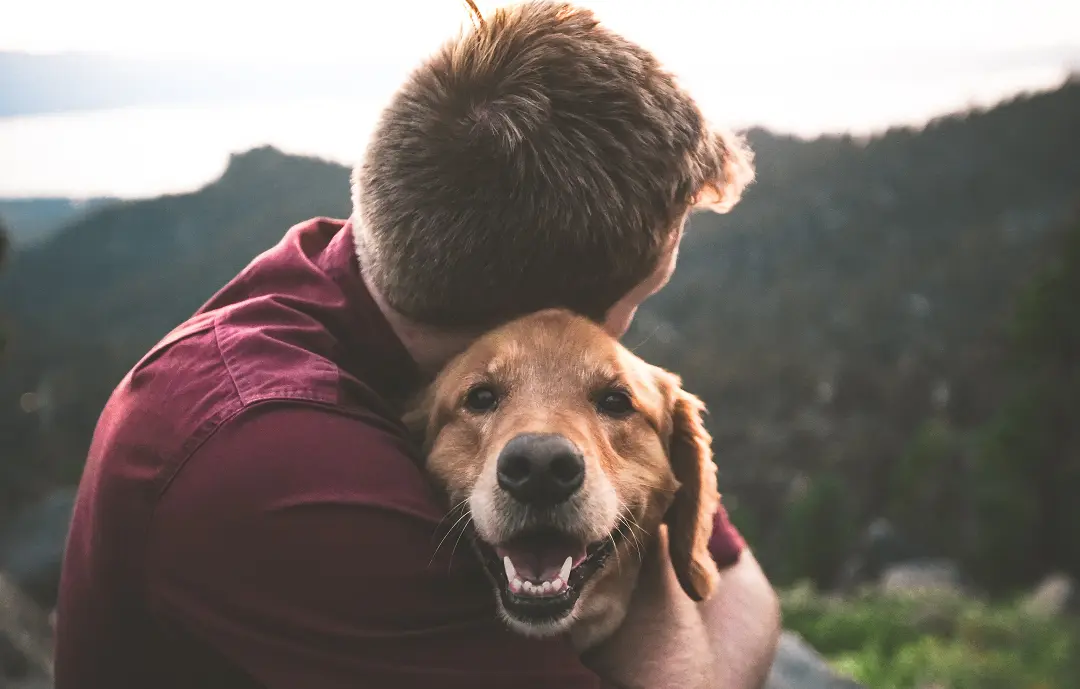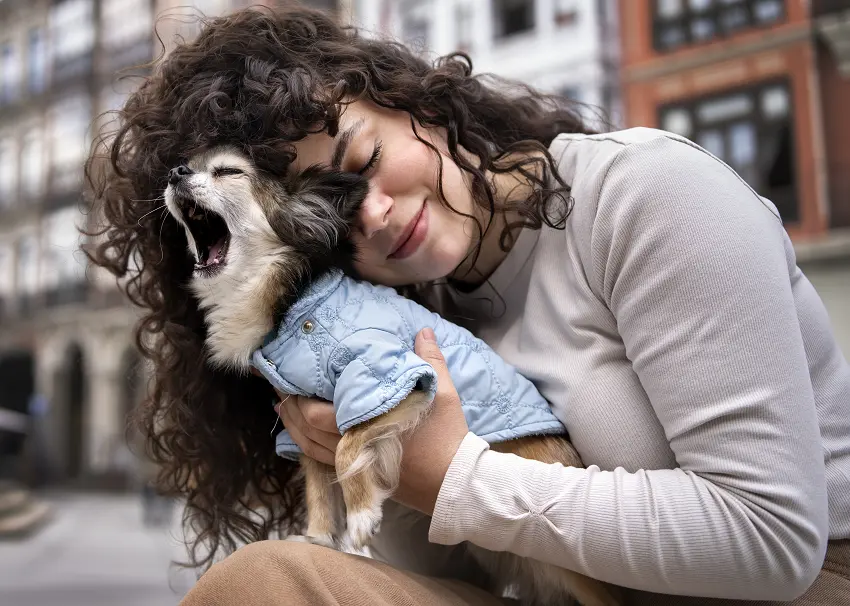My Dog Yelps When Picked Up – 5 Potential Reason
Almost every dog owner will run into a time where their dog yelps when picked up. The first thing you should do is stay calm and try not to panic. Your dog is trying to communicate something to you.
Dogs have a natural instinct to protect themselves, and yelping when picked up may be their way of expressing discomfort or fear. This instinct is rooted in their wild ancestors who needed to be cautious of potential threats. Some dogs may be more sensitive and easily startled, causing them to yelp when picked up.

Additionally, dogs have sensitive areas on their bodies that can cause discomfort when handled. These areas include their abdomen, paws, and tail. Gentle handling and avoiding these sensitive areas can help prevent your dog from yelping when picked up.
Gently assess what the cause could be. If your dog cries when picked up, it could also be due to injury or something serious. In that case, you may need to consult with your veterinarian.
My dog yelps when I pick him up
Is your dog in pain when picked up? Or maybe your dog is vocal and your dog yelps when picked it. If it occurs when you try to pick up your pet, the following might be reasons why:

1. Your dog has joint problems.
According to my dog’s vet, the common reason for this reaction is joint or muscle problems. Your dog is in physical pain. Picking it up only makes the pain worse because you’re moving or touching the affected part.
Old dogs with arthritis are prone to this. You will notice your dog yelping when touched or trying to move due to their sore joints. Take note that canine osteoarthritis is a degenerative disease and it doesn’t have an absolute cure. Still, you can manage your dog’s pain through prescribed medications and lifestyle changes. Work closely with your vet to manage your dog’s quality of life.
Another possible reason here is hip dysplasia. This is a congenital defect when the hip bones don’t form properly. As your dog grows older, it becomes worse. Such a predisposition to the condition is aggravated by intense physical activity.
Dogs with hip dysplasia will be reluctant to get up even when called. And when you try to pick them up, the doggo will yelp when you touch its rear area.
Both of these conditions require proper veterinary care. This is to improve your dog’s quality of life and limit the symptoms.
2. Your dog has injuries.
If your dog doesn’t have joint problems, an injury might be the primary cause. It’s possible that your dog hurt its body while playing or zooming too fast.
When you try to pick it up, it will yelp and cry in pain. Other canines will growl and bare their teeth. Soft tissue injuries can occur if your dog overdoes playing. Also, this can be sustained if your dog fell or jumps from a highly elevated surface.
It’s best to bring your dog to the vet’s clinic to identify the exact injury it has. This will be followed by treatment to end your pet’s agony.
3. Your dog has some kind of infection.
Infections can also make your dog cranky. The discomfort from the infection makes your dog reluctant to be touched or held. In turn, it will yelp or even bite back.
For example, a skin infection will make your dog feel itchy and painful. When touched, the infected part will cause pain.
It’s important to pay attention to where the infection is occurring. The challenge here is that some infections won’t manifest on the surface. This is why you should bring your dog to the vet if the yelping and discomfort aren’t going away.
4. Your dog is having cramps.
Muscle spasms can also make your dog yelp when touched or picked up. This condition can cause lameness, pain, and depression on canines, especially if it’s lingering.
Spasms can occur on canines because of injuries, allergies, dehydration, and neurological disorders. You will notice your dog yelping and shaking as you pick it up. Take note that this episode can also occur even if you’re not picking up the dog.
Upon proper diagnosis, the vet can recommend exercises to reduce the stiffness of the dog’s muscles. Your dog will also have to take medications to reduce the occurrence of spasms.
5. Your dog is anxious.
Lastly, your dog is probably very anxious. Picking it up will only contribute to the fear or stress the canine is feeling, more so if they are not familiar with the person who is lifting them.
This happens when your dog is exposed to a stressor. It could be another dog, a person, or a loud sound. Picking up the doggo out of the blue, which can cause confusion.
Dogs with separation anxiety are prone to this reaction. It’s important to desensitize your pet to the stressors so it won’t feel anxious and on edge all the time.
Dog Yelps When Picked Up – Frequently Asked Questions
How do you help a dog in pain?
If your dog is yelping out of pain, the first thing you should do is bring it to the vet. Never self-medicate your dog as it can only lead to further discomfort.
In case of joint and muscle problems, the vet can prescribe painkillers to help alleviate your dog’s discomfort. Limiting the dog’s physical exertion will also help, especially if it’s yet to recover from an injury.
Aside from that, you should keep food and water close to where your dog is resting. You should also carry the dog outdoors to eliminate.
Why does my dog yelp when picked up under chest?

If your dog yelps when touched on the chest area, it might indicate neck pain. Abdominal issues can also cause this reaction from your pet. It’s best to consult the vet to know what’s exactly your dog is going through.
Why does my dog yelp when picked up after shots?
It’s normal for dogs to become lethargic after receiving vaccinations. However, yelping and being in pain isn’t one of the usual side effects.
It’s possible that your dog is dealing with swelling on the spot where it’s given the shot. If this is accompanied by shaking, you should bring the dog back to the vet’s clinic. These are tell-tale signs of an allergic reaction, which can happen to some canines with extreme sensitivity to certain vaccines. Also, there’s a possibility that your dog has been vaccinated twice.
Why does my dog randomly scream in pain?
Random yelping and crying in pain is observed in old, arthritic canines. They feel a sudden jolt of pain when they try to get up or move.
However, if your dog is healthy and young, you should consult the vet. Your pet might have an underlying condition or injury that requires immediate treatment.
What human painkillers are safe for dogs?
You should never use human painkillers on canines. Sherlock’s vet has seen dozens of dogs taken into the clinic after being given ibuprofen.
Dogs and humans have different physiological processes. This is the main reason why you should never self-medicate your pet with painkillers you have at home. It could take a deadly turn for your dog. For example, ibuprofen will lead to bloody vomits that are life-threatening for canines.
If you want to ease your dog’s pain, you should ask the vet for painkillers that are made for dogs. Aside from the specific drug, the veterinarian will ensure that the dosage is suitable for your pet. Sure thing, the consultation will cost a fee, but that’s much smaller compared to the vet bills once your dog reacted harshly to human painkillers.
Conclusion
Understanding why your dog yelps when picked up is crucial for addressing this issue effectively. It could be due to their natural instincts, medical causes, fear and anxiety, past traumatic experiences, or improper handling techniques. By identifying the underlying cause, you can take steps to help your dog feel more comfortable and secure.
Whether it’s providing gentle handling, consulting with a veterinarian, working with a professional trainer or behaviorist, or creating a positive environment, there are various approaches to address your dog’s yelping behavior. Remember, every dog is unique, so it may require patience and understanding to find the best solution.
By investing time and effort, you can create a stronger bond with your furry friend and ensure their overall well-being. For more information on dog behavior and training tips, be sure to explore our other blog posts.
